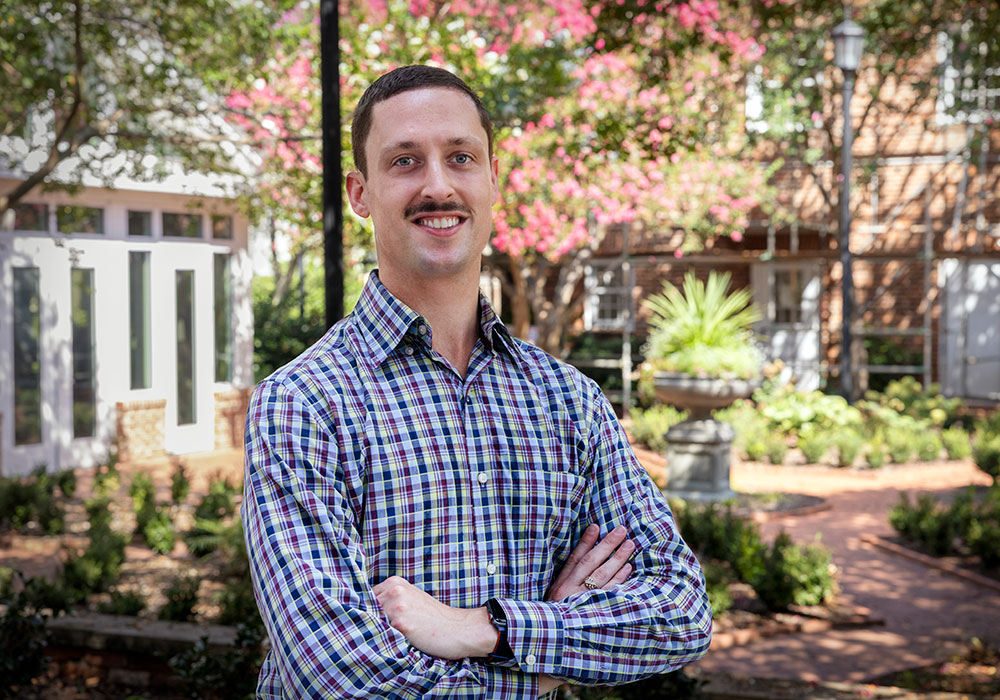Brett Robertson believes education goes beyond content delivery — it should challenge students to think critically, empower them to engage with real-world problems and inspire tangible impact. And the best way to do that? Appeal to students’ individual interests, abilities and learning styles.
He says that finding ways to engage students’ different learning preferences has been a challenge. But it’s led to success in courses like research methods, data analytics and environmental messaging.
“It takes a little bit of time getting to know where students are — they may have a baseline level, but we’re not necessarily aware of that as instructors,” says Robertson, who was awarded the Michael J. Mungo Undergraduate Teaching Award.
In addition to his role as an associate professor in the College of Information and Communications, he serves as associate director of the Hazards Vulnerability and Resilience Institute, where he leads research and teaching efforts focused on disaster communication, risk perception and how communities respond to emergencies.
“As instructors, we need to tailor course content to meet students where they’re at and understand what their needs are. If their needs require going back and learning some of the basics, then we take time to do that. If they seem to be more advanced in their knowledge, then we find ways to translate the course skills and elevate the material to a higher echelon — to reflect the urgency and complexity of today’s world.”
One of the ways Robertson has been able to meet students where they are is by breaking complex topics into approachable steps and encouraging students to apply what they’ve learned in practical, engaging ways. In his courses, students have conducted statistical analyses of survey data, analyzed crisis response case studies, created public service announcements, and even produced short films. These varied formats allow students to demonstrate understanding through analytical, creative and professional lenses — aligning course content with real-world challenges.
"Students have access to so many resources through our library, so it behooves me as an instructor to incorporate them into our learning. That way, students are using campus resources without taking on additional financial strain. Knowledge should be within reach to everyone — regardless of what’s in their wallet.”
“Students’ learning preferences today are so different from what they were,” he says. “In the past, I might have had students write a five-paragraph essay or walk through calculations by hand. Today, I’ve found that offering multiple pathways to reach the same course learning outcomes leads to stronger engagement. If you give students some flexibility in how they can reach those goals, they become more passionate learners.”
At USC, he has developed courses rooted in data-driven approaches and the principles of social science, helping students build stronger critical thinking and analytical abilities. For example, he partnered with the City of Columbia’s Office of Sustainability for his environmental communication course to develop a sustainability plan and identify community groups with limited engagement in the city’s environmental initiatives. Students worked directly with Columbia city leaders to provide an analysis while simultaneously gaining practical, hands-on experience in data interpretation and applied messaging strategies. He also teaches a course in crisis management, where students take a crisis happening in real time and apply course concepts to coordinate a response.
He prioritizes cost-conscious and open-use materials in his courses, opting for low-cost resources over traditional, high-cost textbooks. His dedication to reducing financial burdens on students earned him the 2022 SCoer Faculty Award for Open Educational Resources.
“I believe in the power of affordable education,” he says. “Oftentimes, courses can rely on costly textbooks or assessments that become obstacles to student participation, so I work with our library to find open educational resources. Students have access to so many resources through our library, so it behooves me as an instructor to incorporate them into our learning. That way, students are using campus resources without taking on additional financial strain. Knowledge should be within reach to everyone — regardless of what’s in their wallet.”
Mentorship has also played an important part in his career. He’s been able to help students pursue research in areas like environmental advocacy and use his network to connect them with media professionals.
“Undergraduates are such a huge part of the work we do as faculty at USC,” he says. “I want students to get to where they want to go, so I try to help however I can, whether it’s reviewing resumes, making professional connections or writing letters of recommendation, because when I was a student, my professors did that for me, and now as a faculty member, my peers and colleagues continue to do the same for our students — and for me. I like to say that I’m simply paying it forward.”
